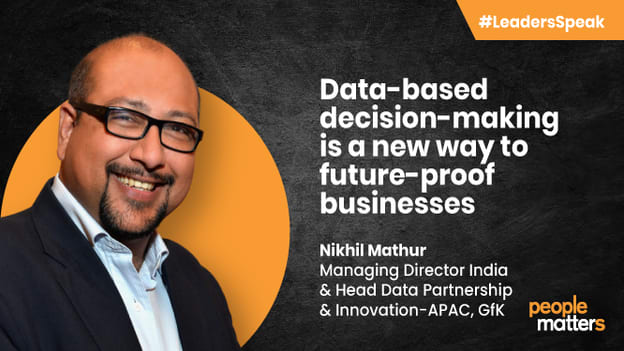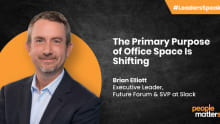Data-driven dialogues are the key to cultural transformation: GfK’s Nikhil Mathur

Nikhil Mathur is the Managing Director, India and Head Data Partnership & Innovation-APAC, of GfK, a tech-enabled consumer and market intelligence company with expertise in the tech and durables market. It recently launched the AI-supported business intelligence platform “gfknewron” which enables teams to gain actionable insights, collaborate effectively, and act at speed to ignite sustainable growth.
Mathur joined GfK in 2010 and has been instrumental in setting up new market measurements for the Technology Goods sector in South Asia, during his previous role as Director for South Asia market. His core expertise lies in evaluating Point of Sales Analytics and developing strategies for clients in the Telecom, IT and Electronics industries.
Mathur has worked with prominent research organizations such as GfK Nielsen India and KANTAR IMRB, consulting various Indian and Fortune 500 companies for over 20 years.
In an interview with People Matters, he spoke about the platform, the challenges of plumbing through data, and how this capability could transform organizations.
Here are some excerpts.
How is the rise of AI enabling leaders and organizations to make informed decisions across functions including HR?
In this fast-paced business environment, the decision-making process is shifting to newer levels, owing to the high stakes and complexities of situations. Data-based decision-making is a new way to future-proof businesses, which is powered by AI. It allows leaders to synthesise the large volume of data from multiple sources to represent a single point of truth, do simulations and get the optimum solution. It brings in speed, consistency, and smart data-based culture and takes away many personal biases.
AI technology is now being effectively embedded into the entire lifecycle of employee recruitment, engagement, and development. With hybrid work culture, data from bots, video analytics, social chatter, etc. allow HR leaders to get better and faster insights on people, which is used by them in making decisions.
Besides, another prominent trend observed under the aegis of industry 4.0 has been digitalisation which drives change in how individuals behave at work. The volume of data generated at the customer and employee level helps understand their underlying motivation and behavior patterns. Since the speed of change is faster, agility is important.
Do you think data-driven dialogues shape an organisation's cultural transformation?
Data-driven dialogues are the key to cultural transformation, and I think it's more about integration. It has led to a single source of data across all businesses instead of siloed data approach. In a way, it has led to increased collaboration between teams and provides a much broader range of answers for organizations than before. An integrated data culture allows you to cut the pain of conflicting data sources and views and identify signals from the noise, thus paving way for internal efficiency.
The objectivity offered by AI algorithms takes away a lot of gut and emotions, which allows prioritisation of evidence-based reasoning and decision making. This compounds over time and the rate of success for the organization while managing internal, as well as external stakeholders, improves.
What are the top two work trends that you feel would define the future of work this year?
Manager employee connect will be the top priority, given the reduced facetime, high digital pressure, and the open job market. Managers will be making extra efforts to strengthen relationships in all areas of social, professional, development, and growth of their team members.
Borderless talent attraction: The rise of hybrid and remote work model is breaking geographical boundaries and is becoming a winning approach for companies and candidates.
High-end gig work culture will further gain momentum owing to new norm of borderless office.
Therefore, I believe, the new ways of working in this age of digital transformation are centred around collaboration. Data and technology can provide insights to fuel cross-pollination within organisational structures and transform teams into collaborative and agile units that can adapt quickly to changing environments.
What are the top priorities you think will help leaders stay ahead in a disruptive world?
Successful leaders display “Empathy with Agility” and “Innovation and Digitalisation” to stay ahead in a disruptive world.
Empathy with agility: During the challenging times of the pandemic, leaders who navigated strongly to turn crisis into opportunities, have ensured empathy in their approach towards stakeholders and people. This helps in strengthening trust and loyalty. Secondly, those who adopted agility over panic or knee-jerk reactions were able to drive the organisation better.
Innovation and digitalisation: Digitalisation is not a choice anymore and has become a necessity. Successful leaders will continue to invest in the digitalisation of their business and make innovation one of the cores of their culture and focus.
Do creative ways increase collaboration in teams? What are the keys to managing employees working in remote and hybrid mode?
Clear expectations and focus on the outcome: As hybrid work models are a new norm, it is vital to have a clear alignment of expectations focusing on the outcome and results. This minimises friction.
Communication and documentation: As we shuffle between the office and remote working with different team members, ensuring an effective communication process is very important. The second aspect of this would also be documentation/recordings of various meetings. This allows people to refer back and avoid minimum translation loss.
Transparency of workflow and progress: Sharing progress is a good way to enhance collaboration and improve ownership in a hybrid model.
Flexibility for all: With the hybrid model, empathy and flexibility in culture helps collaborate and improves trust levels.
Celebrating success: this is an important aspect of the hybrid model, where one needs to build platforms for celebrating success, recognitions, rewards, and inclusion. It surely fosters teamwork and steam passion.
What are the lessons from the pandemic and one piece of advice on balancing work and life priorities better?
- Health and wellbeing should be the top-priority.
- In terms of business, the pandemic has changed the way every business operates, and we have adapted to the changes in the best possible way. Thus, leaders must have the Plan B and C in place to tackle uncertainties. One must, as a collective organisation, drive innovation in whatever one does.
- Effective communication is the key to bridging the gaps among teams/ stakeholders. Thus, communicate with brevity and know when to ask for help.
- Anticipate the problems and prepare for them by creating support systems at home and office.
- Bring discipline in the work-from-home regime for a better work-life balance.




